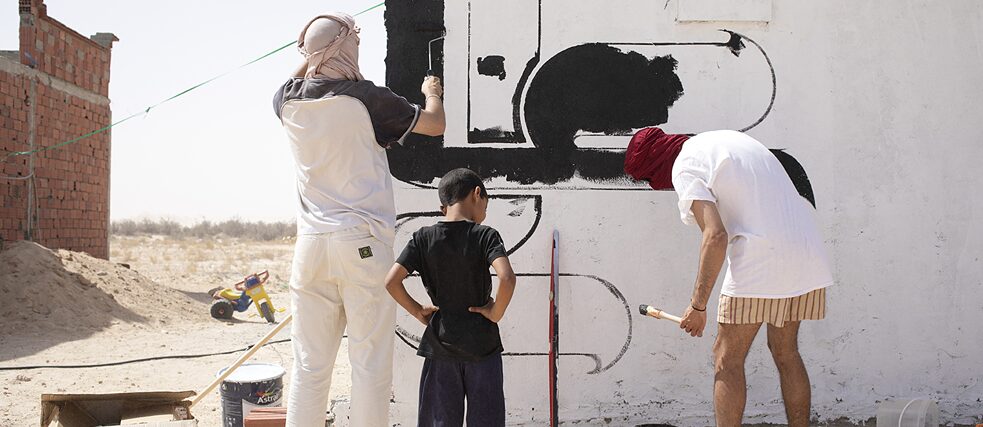“Small actions can make a big difference.” Based on this motto, the Ta’ziz Project Houmtek (Your Neighborhood) was launched in 2018 in Tunisia. The aim of the project is to provide local activists and civil societies with the training and funding they need to implement their projects of beautifying Tunisian neighborhoods and making them more sustainable and responsive to the residents’ needs.
In its first run (2018-2019), Houmtek received 87 applications mostly from Tunis, which increased to 150 from more than 12 Tunisian governorates in the second run (2020-2021). In the selection process, the applications with the highest scores on sustainability, need, feasibility, innovation, as well as local participation are chosen. These were five projects in 2018 and 12 in 2020. Carriers of the chosen projects are offered workshops on the necessary skills of project management, such as design thinking, project development and financial planning. Afterwards, participants start implementing their projects after adapting them to local conditions.
One of the funded projects was HoumtyZina in Beni Khiar, where illegal waste dumps were cleaned and turned into ball courts for children and adolescents to reduce criminal activities and school dropouts among children in this underprivileged neighborhood. Samira Ben Ammar, head of the civil society BledyZina, commented on the role of Houmtek saying: “I took part in Houmtek because it was devoted to beautifying working-class areas [like BledyZina]. The Houmtek-workshops I participated in helped me define the logical framework and the requirements of my project.” Also complying with the children’s needs, Nhebbou Jabbés enabled the children of Jabbés to design the playgrounds they wished to see in their village and to turn the design most voted for into reality. This allowed “the children to shape the culture of the village”, as Hédi Khélil, head of the association Bac Art Center, said. Similarly, other projects such as El Kim by Art à Maknassy are determined to turn neglected squares and neighborhoods into lively get-together spaces by adding seats, outdoor gyms and playgrounds. Additionally, Recycle for the Best by Jeunes Actifs in Kasserine plans to build the new seats and playground equipment from waste materials collected from the same area.
Many projects were concerned with environmental awareness. For example, El Feija pour Tous by the association Mawtini byati focuses on the preservation of the national park El Feija. Greenhouses of the recently reopened park, as well as the visitors’ area are being restored with the active involvement of the residents of the nearby town Ghardimaou. In Ariana, the association Vélorution has built and set up bicycle racks throughout the district, thereby easing the everyday lives of bicycle riders. According to its manager, Stéphanie Pouessel, the project lets “cyclists feel respected and free” and “aims at restoring the dignity of cyclists in Tunisia”.
Other projects have chosen education to promote sustainability. Madrasti Mostaqbali lead by Association de commerçants in Ben Guerdane, a desert settlement near the Libyan borders, is currently renovating the classrooms and the sanitary facilities of the local primary school, as well as building a school library. Meanwhile, a wood workshop is being constructed in the center of Nefta as part of El Warcha by Association Collective Créative to teach students of the local school the know-how of wood craftsmanship.
Cultural sustainability highlights projects like Bir El Jmal in Beni Khaled, that is currently restoring the architecture of the old city’s buildings, thereby preserving its precious cultural heritage. Another example is Project ST4, a capital-based group of street artists who visited small desert villages to paint artistic graffiti on the walls of the homes. Amenallah Elatrous of ST4 recalled: “Houmtek raised special attention among [artists] from South-Tunisia. [..] We realized the cultural scene in the [rural] south is minimal compared to [..] big cities. This motivated us to take part at Houmtek-workshops and be inspired by the know-how of the trainers”.
Not only did the Ta’ziz Project “Houmtek” give all these local civil associations the chance to carry out their ambitious projects, but it has ensured that the residents were actively involved from the start. Having the possibility of developing their hometowns according to their needs and wishes should give them the self-confidence to get more involved in civil and political decisions.
